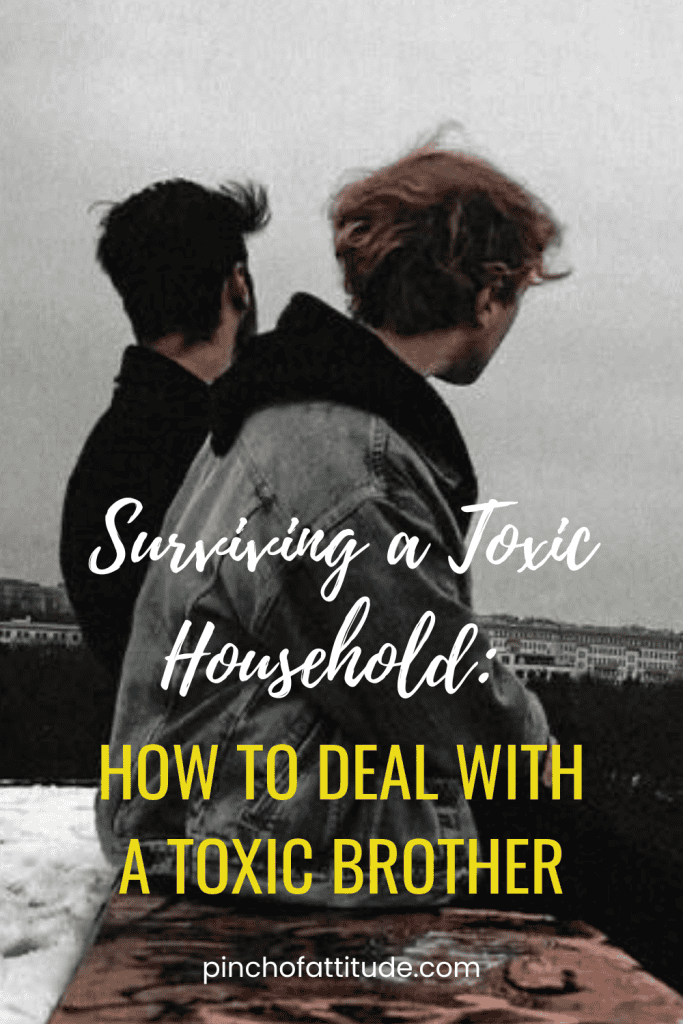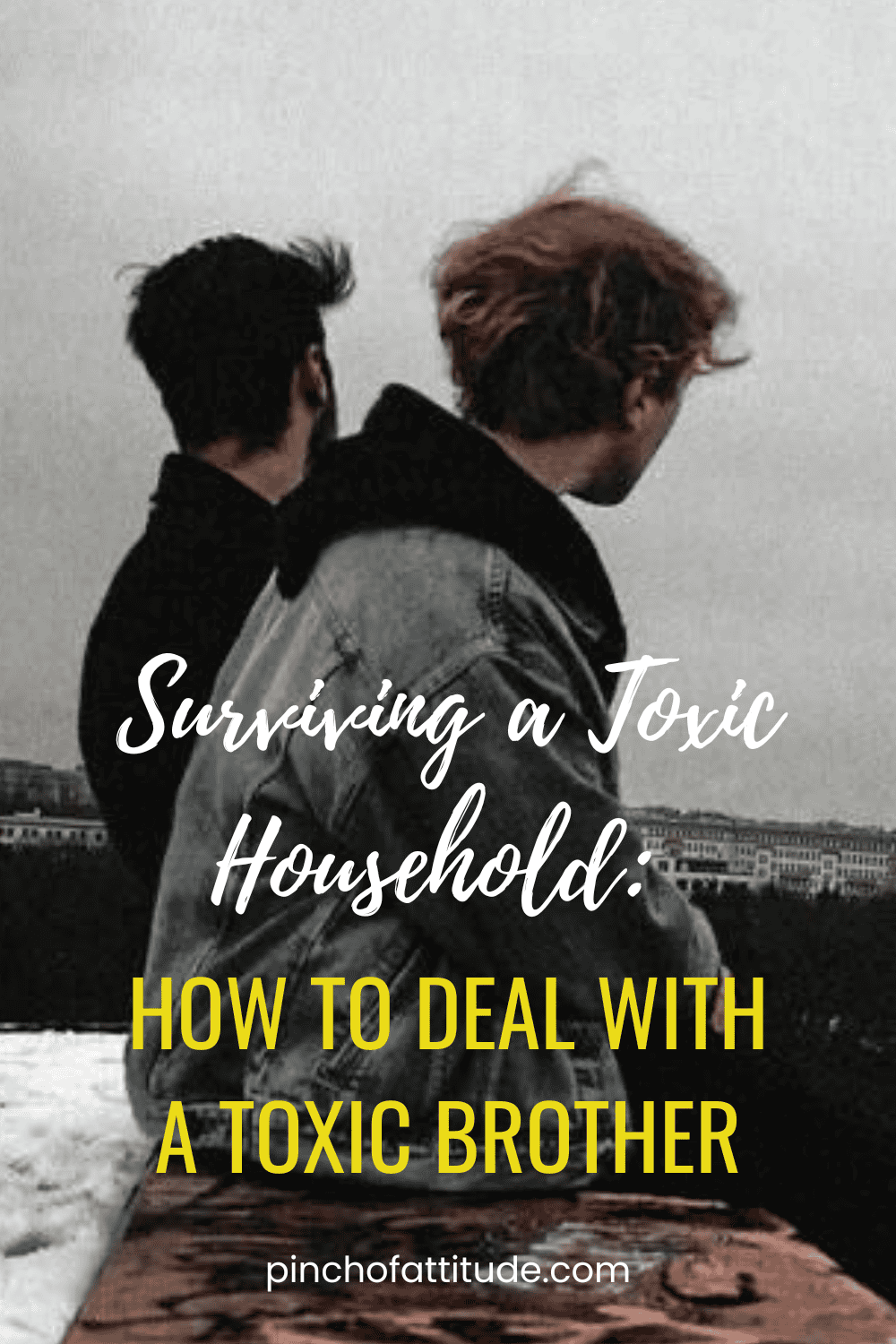Growing up in a dysfunctional family can sometimes feel like you’re stuck in a drama with no off button.
But my family? Let’s just say “toxic” doesn’t even begin to describe it.
I’m one of three kids in a family headed by a narcissistic mother. My eldest sister and younger brother were her golden children, while I got the role of the black sheep.
But I’m not here to talk about them. I’m here to talk about my little brother, the favorite of all, simply for being the only boy in our family.
So, how do you deal with a toxic brother? Let me share how I did it so you can start breaking free from his toxicity, too!
- Don’t be afraid to limit contact or say “no” to protect your mental health. You deserve to feel safe and respected, even from family.
- Use “I” statements to express your feelings. Remember to disengage from arguments that escalate the situation.
- Recognize your triggers and respond calmly to protect yourself.
Table of Contents
17 Ways on How Do You Deal With a Toxic Brother

Believe me, I can understand why you’re feeling lost and confused about how to handle a toxic sibling. I felt the same way, too.
Of course, there’s no one-size-fits-all approach.
However, below is a list of all the best ways to deal with a toxic sibling relationship based on my own experiences:
1. Set Clear Boundaries
We all long for healthy and supportive connections with our family members, but sometimes it’s just not possible.
In my case, my brother’s negativity and manipulation constantly drained my energy.
He constantly pushed my limits, whether with manipulative comments, hurtful jokes, or disregarding my feelings.
That’s when I realized I needed to set boundaries to protect myself.
Setting healthy boundaries wasn’t easy at first. He often guilt-tripped me to cave in, but I learned to firmly yet politely decline his unreasonable requests and demands.
It was like putting on an emotional hazmat suit – I could still interact with him but without getting caught in the toxic fumes.
2. Communicate Your Feelings, Even When It’s Tough
I know, I know. The idea of calmly letting your sibling know how his actions make you feel might sound like trying to reason with a brick wall. But hear me out first.
I tried doing this myself and while the conversation wasn’t exactly sunshine and rainbows, it did allow me to make things right on my end.
It also opened the door for him to acknowledge his actions or at least hear about their impact, even if he didn’t necessarily apologize.
Regardless of his response, expressing my feelings helped me feel empowered and finally put to rest some lingering resentments.
It wasn’t a magical fix, but it was a step towards emotional clarity.
3. Disengage From Conflicts to Avoid Escalation
Just like my toxic sister, my brother had a knack for turning any conversation into a full-blown argument.
In cases like these, the best way to protect your sanity is to disengage.
This didn’t mean I was condoning his behavior, but rather recognizing that getting sucked into his negativity only made things worse.
Instead, I developed a mental “off switch.”
It won’t always be that easy, especially when emotions are running high.
But not engaging will prevent unnecessary drama and help you prioritize your peace of mind in a relationship with a sibling that felt like a constant warzone.
Tip
If things start to escalate, don’t engage in the fight. Calmly excuse yourself, leave the room, or simply change the subject.
4. Lean on Trusted Friends or Family for Support
Most of us were raised to believe that having a sibling means having a guaranteed source of support and comfort. But for some, they can be a source of pain.
Fortunately, I discovered the importance of leaning on trusted friends or family when things get tough.
While you don’t get to choose your family, you can choose your friends and who you confide in.
Surrounding myself with people who genuinely cared about me and were ready to listen without judgment became a lifeline.
They allowed me to process my emotions, vent my frustrations, and gain valuable perspective.
5. Limit Contact to Necessary Interactions
While completely cutting him out wasn’t an option due to family gatherings and occasional unavoidable encounters, I learned to limit contact to necessary interactions.
This meant declining invites to spend time together, keeping conversations brief and factual, and maintaining a physical distance.
You don’t have to deal with toxic people just because they share your blood.
At first, you might feel guilty for setting these boundaries, but ultimately, you’ll realize that protecting yourself from his disrespectful behavior is essential for your well-being.
For me, it was like finally taking off a pair of shoes that were always a few sizes too small — uncomfortable and restricting.
I may not have the ideal sibling bond, but I never looked back on this decision. My peace of mind was worth more than the pressure to conform to an unhealthy dynamic.
6. Prioritize Your Mental and Emotional Health
My sister has always been close to my brother. As for me? I couldn’t ignore the toxic energy in their dynamic.
It felt like a competition, a constant “keeping up with the Joneses” but with my own family. This is why it became crucial for me to prioritize my mental and emotional health.
By prioritizing my well-being, I finally understood that talking to my brother didn’t define me, nor did it determine my happiness.
This doesn’t mean that your sibling relationships are gone for good. That’s up to you. For now, you’re just choosing to put yourself first.
7. Use “I” Statements to Express Your Feelings
When I needed to express my feelings to my brother, I learned the power of “I” statements. What do I mean by this?
It’s simple. Just don’t say accusatory things like “You always put me down.” Instead, focus on your feelings and their impact.
For example, you could say, “I feel hurt when you make jokes at my expense.”
Through this approach, you’re letting them know the impact of their actions and allowing them to understand your perspective, but you’re not placing blame.
8. Refrain From Retaliating or Sinking to His Level
It’s tempting to fall into the trap of retaliating when your brother tries to push your buttons. But I learned the hard way not to engage his negativity.
Don’t let your toxic sibling’s behavior dictate your actions. Instead, focus on staying calm and choosing your responses thoughtfully.
This meant not responding to his insults, ignoring his attempts to bait me, and refusing to get a reaction out of me.
Tip
Your brother’s actions are a reflection of him, not you. Don’t allow his negativity to define who you are or how you would react.
9. Be Conscious of Your Reactions and Emotions
When dealing with negative people, sometimes you find yourself unconsciously reacting in ways that aren’t healthy or productive.
That’s when I realized how important it is to become conscious of my reactions and emotions. This meant observing my thoughts and feelings before responding.
Did his words trigger anger, sadness, or frustration? Recognizing these emotions allowed me to choose how to react instead of letting them dictate my behavior.
Being conscious of what you’re feeling will allow you to stand your ground without resorting to negativity.
It’s not about becoming emotionless, but about understanding and managing your emotions to respond in a way that is healthy and empowering.
10. Consider Professional Counseling for Guidance
While the strategies I mentioned helped me manage the situation, I also realized there was a limit to what I could do on my own.
Sometimes, you simply can’t fix a broken relationship, and that’s okay.
If you’re struggling to cope with a toxic sibling and feel like you’ve exhausted all your options, seek professional help.
A mental health professional can provide invaluable guidance, support, and tools to help you navigate this challenging dynamic.
Even if you don’t necessarily want to mend the relationship, therapy can still help you process your emotions, set healthy boundaries, and prioritize your well-being.
11. Focus on the Positive Memories You Share
As one of his older siblings, I’ve seen different versions of him, and he wasn’t always this toxic.
We used to have moments of genuine connection and shared some positive memories.
Remembering those times helped me understand that the negativity wasn’t an inherent part of him, but rather an external influence on his life.
This realization, while not an excuse for his behavior, allowed me to detach myself emotionally and move forward without bitterness.
12. Educate Yourself About Toxic Relationships
Through books, articles, and even online resources, I gained valuable knowledge about the characteristics of toxic behavior and its impact on individuals.
This newfound understanding helped me make sense of my experiences and recognize the manipulative tactics my brother used.
This knowledge wasn’t just about labeling my brother.
It was more about empowering myself to navigate this complex relationship with greater clarity and confidence, ultimately making my life more manageable.
13. Try to Understand His Perspective
While I wasn’t always comfortable with my brother’s behavior, attempting to understand his perspective, even if I didn’t agree with it, proved to be surprisingly helpful.
It was challenging to see things from his point of view. However, I couldn’t help but wonder if his negativity stemmed from feelings of inadequacy or even jealousy.
This wasn’t to diagnose him, but rather to consider the possibility that his toxic behavior was a way of coping with his insecurities and low self-esteem.
Understanding his potential struggles didn’t change how I interacted with him, but it did allow me to approach the situation with a sense of empathy.
14. Stay True to Your Values and Integrity
Sticking to my morals, even when it felt difficult, was crucial in maintaining a sense of self-respect and inner peace.
Staying true to who I was, even in the face of his negativity, empowered me to create a life that aligned with my beliefs and values.
It was a constant reminder that I wasn’t defined by his actions but by my own choices and commitments.
Don’t make the mistake of allowing his behavior to dictate your actions.
You’re not being stubborn. You’re just protecting your core values and ensuring his toxicity didn’t have an undue influence on your life.
15. Keep a Record of Significant Incidents

My toxic mother often fueled my brother’s negativity, making it difficult to separate his actions from the broader family environment.
In such situations, keeping a record of significant incidents can be incredibly helpful.
It isn’t about revenge or blame. It’s about ensuring that the truth of the matter is documented, especially in situations where your well-being might be at risk.
While this may seem extreme, such a record can be valuable if you ever need to deal with toxic siblings in a legal or professional setting.
It can serve as a concrete reminder of the reality of the situation, especially if your perception is being gaslighted or dismissed.
16. Involve Authorities in Cases of Abuse
My situation with my brother, while toxic, never escalated to physical abuse. However, I understand that some might be facing situations involving maltreatment from a sibling.
If you are experiencing abuse from your sibling, involving the authorities is your right and may be the only way to ensure your safety.
Reach out to a trusted adult, call a helpline, or visit a website for resources on how to report abuse in your area.
Tip
Don’t hesitate to seek help if you are facing abuse of any kind. Your safety and well-being are the top priorities.
17. Work Towards Forgiveness for Your Peace of Mind
Forgiving a toxic family member doesn’t mean forgetting the past or forcing a reconciliation with your brother or sister.
It’s a personal choice that allows you to decide where you stand emotionally.
For me, it’s about acknowledging the pain and choosing to move forward without letting my brother’s negativity continue to control my life.
That said, forgiveness is a personal choice. It’s okay if you’re not able to forgive now.
Ultimately, the goal is to prioritize your well-being and find a path toward a life filled with peace and happiness.
Why It’s Important to Deal With Your Toxic Brother?
Addressing a toxic sibling relationship, while challenging, is important for your long-term well-being and personal growth.
Leaving it unaddressed allows their negativity to permeate your life, potentially making your life miserable and hindering your ability to thrive in other relationships.
In my case, dealing with the situation, even in small steps, allowed me to reclaim my emotional well-being and maintain self-respect.
Who knows? It might even help pave the path towards a healthier dynamic in the future.
By setting boundaries and prioritizing your needs, you become better able to protect yourself from their negativity.
Doing so will also make you feel empowered to navigate other challenging relationships.
You deserve to live a life free from negativity and filled with healthy, supportive relationships.
If you ignore the issue, your sibling may impact your ability to build these healthy connections.
Tip
Addressing the situation doesn’t necessarily mean reconciliation, but rather taking steps to protect yourself and prioritize your well-being.
Related Posts:
- 25 Signs of a Toxic Brother You Need to Watch Out!
- Toxic Brother Relationships: Signs, Root Cause & How to Heal
- What to Do if Your Brother Is Toxic? Steal My 13 Drama-Free Tips
- When Should You Let Go of a Toxic Brother? My Answer From Personal Experience
- How to Cut Ties With Your Toxic Brother? It Was Worth It for Me
Frequently Asked Questions
Why is it essential to address toxic behavior in your sibling relationship?
Addressing toxicity in sibling relationships is crucial because it can affect your mental health and overall well-being. Ignoring it can lead to resentment and damage the relationship irreparably.
What are effective ways to communicate boundaries without escalating conflicts with your toxic brother?
Communicate calmly and assertively using “I” statements. Set clear, specific boundaries while also listening to his perspective to find common ground.
Is it possible for your toxic brother to change his behavior, and how can you support that change?
Yes, your toxic brother can change. You can support him by offering understanding and encouraging professional help if needed.
What role do mutual respect and understanding play in dealing with your toxic brother?
Mutual respect and understanding lay the foundation for healthy communication and empathy. If you want to be closer, these can help rebuild trust and strengthen your relationship.
How do you determine the appropriate boundaries to set with your toxic brother?
Determine boundaries by assessing your needs, considering past interactions, and seeking input from trusted sources. Set boundaries that prioritize your well-being.




